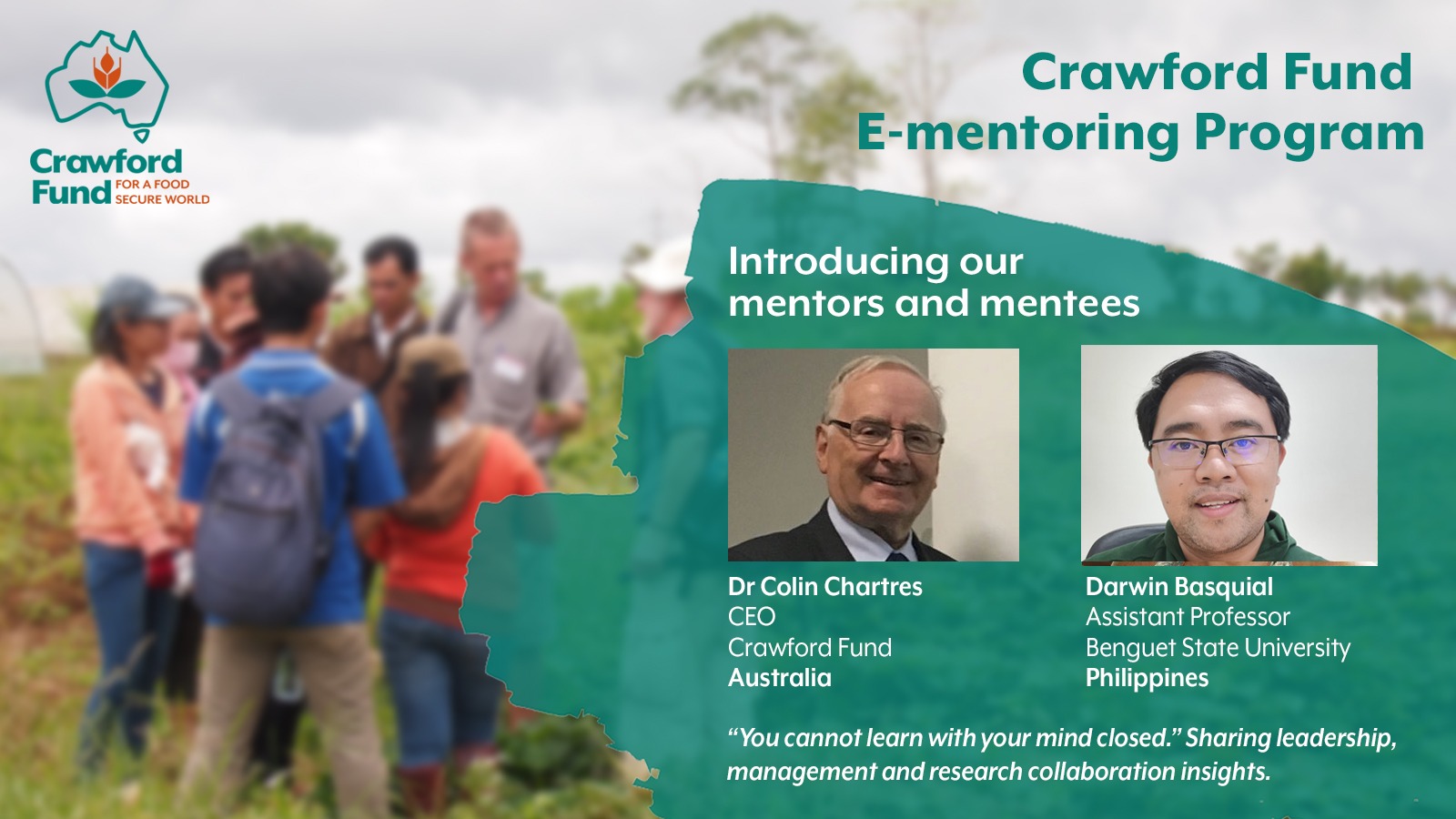

“You cannot learn with your mind closed.” Sharing leadership, management and research collaboration insights through our E-mentoring Program
March 11, 2021

Late last year we announced our first group of e-mentors and e-mentees as part of our new E-mentoring Program. This program was launched to ensure that, despite COVID-19 and its travel and life restrictions, we could continue to help develop the technical and organisational skills and expertise of agricultural researchers, scientists and policy makers in developing countries.
This program builds on the success of our long term existing Mentoring Program, which has seen face-to-face interaction in overseas countries, backed up by electronic contact, and our conference scholar mentoring program, matching young NextGen researchers with experienced Australians who attend our conference.
We hope that these e-connections not only deliver positive and targeted skill-sharing outcomes, but also enduring connections between the Crawford Fund, the volunteering mentors and their mentees, and the institutions and countries involved.
Over the coming months, we will be sharing reflections, in a Q and A style, from our e-mentors and e-mentees and what better person to kick us off than our CEO, Dr Colin Chartres, and his e-mentee Darwin Basquial, Assistant Professor from Benguet State University in the Philippines.
E-MENTOR/E-MENTEE PAIRING
Colin Chartres (Australia) and Darwin Basquial (Philippines)
MENTOR
Dr Colin Chartres – Chief Executive Officer
The Crawford Fund
What motivated you to be a mentor?
Concern that our physical in-person programs could not be run due to COVID-19 travel restrictions and that e-mentoring offered an opportunity to continue working with colleagues overseas.
What are the main goals you are focusing on from your agreed mentoring plan?
General leadership and management skills and helping my mentee develop international linkages to support his work and grant proposals in the Philippines.
What are the various ways you are communicating and what combination are you finding most useful?
Monthly ZOOM meetings and occasional emails.
What are you getting out of our e-mentoring program?
It is enjoyable finding out that some of my experience is being shared and put to good use by my mentee.It also makes me think about how to synthesise management experiences and translate them into general advice for others. It has also made me realise that much of my knowledge and experience in terms of managing organisations and preparing grant submissions can be usefully shared.
Any lessons you could share with the other e-mentors?
I still find that I probably talk too much in our interactions and that the best sessions are those in which I put questions to my mentee and he works through the answers and solutions. From my broader experience of this program, I would say that having a mentoring plan developed by the mentee is vital. Whilst detailed technical knowledge can sometimes be passed from mentor to mentee, I think the larger benefits for mentees focus on the issues of personal development, goal setting, developing networks and just having a person who can advise the mentee on approaches to problems whether management or technical.
Anything more to ad?
The small amount of time set aside for this program brings a lot of satisfaction, particularly if you can see that you are really helping someone else.
MENTEE
Darwin Basquial – Assistant Professor
Benguet State University, The Philippines
What motivated you to nominate to be a mentee?
Being young and new to my current designation, I was placed in challenging situations as well as opportunities to grow and develop professionally. These challenges motivated me to gain new knowledge so I can help where I am right now. With the help of our government, they opened up an opportunity for me to become a mentee in the Crawford Fund e-mentoring program.
What are the main goals you are focusing on from your agreed mentoring plan?
The main goals I am focused on in my mentoring plan are:
1. research leadership and management; and
2. how to work in an international inter-disciplinary research collaboration.
How is the e-mentoring helping your development?
In terms of research leadership and management, my mentor shared character assessment tools that I could use to help me understand myself better. These tools, in turn, can also be used to help me manage the people under my care. There are also reading materials available to help me gain more knowledge in management. What I also appreciate most is my mentor’s sharing of experiences on how he manages his own staff.In terms of proposal making for international collaboration, my mentor is giving me great insights on how to make a winning proposal. My mentor also pointed out a lot of important details I need to improve on in making a proposal. He also gave me opportunities to be linked with international funding agencies!So far, I am learning a lot from my mentor!
Any lessons you could share with the other e-mentees?
You have to take down notes! You have to put in mind that moments with your mentor are precious. You will never know when a great idea will pop up or important details will be given during the conversation, so a pen and paper will help you capture everything.
1. Be honest and open with your mentor. You cannot learn with your mind closed.
2. Enjoy your moments with your mentor.
Anything more to add?
I am so thankful to the Crawford Fund E-mentoring Program!




